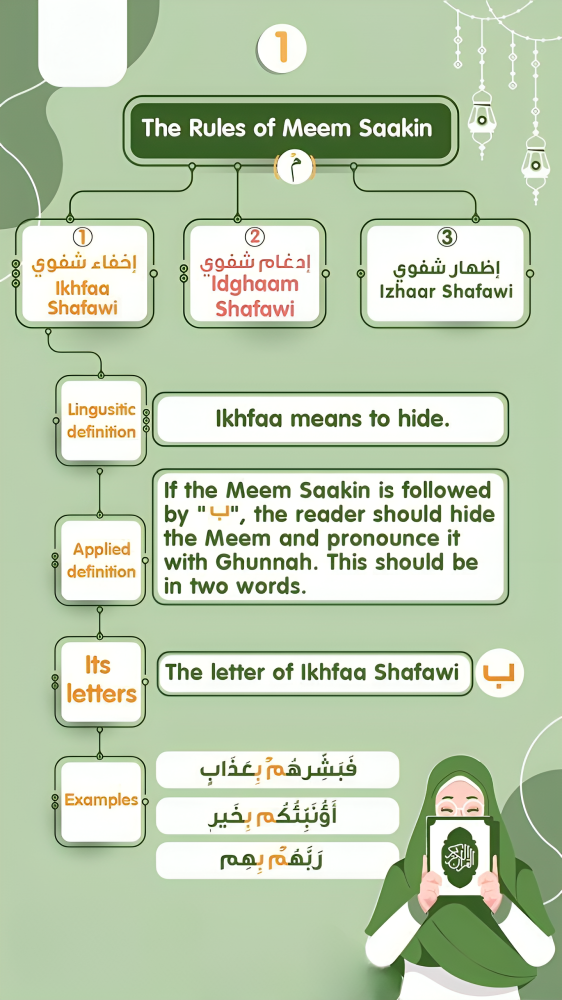What is Ikhfa?
Ikhfa (الإخفاء) literally means “to hide” or “to conceal” in Arabic. In Tajweed terminology, it refers to the partial concealment of the noon sakinah (ن) or tanween when followed by any of the fifteen specific letters of Ikhfa. When applying Ikhfa, the noon sakinah or tanween is pronounced with a nasal sound that lasts for approximately two counts.
The Fifteen Letters of Ikhfa
The letters of Ikhfa are:
- ت ث ج د ذ ز س ش ص ض ط ظ ف ق ك
To help memorize these letters, scholars have compiled them in this phrase:
صِفْ ذَا ثَنَا كَمْ جَادَ شَخْصٌ قَدْ سَمَا * دُمْ طَيِّبًا زِدْ فِي تُقًى ضَعْ ظَالِمَا
How to Pronounce Ikhfa
When implementing Ikhfa:
- The noon sakinah or tanween is not pronounced clearly
- The sound is pronounced with ghunnah (nasalization)
- The sound is held for two counts
- The sound merges partially with the following letter
Examples from the Quran
Here are some common examples of Ikhfa in the Quran:
- مِنْ تَحْتِهَا (min tahtiha)
- مَنْ ذَا (man dha)
- يَنْصُرُ (yansuru)
- مِنْ قَبْلُ (min qablu)
- أَنْ كُنْتُمْ (an kuntum)
Common Mistakes to Avoid
When practicing Ikhfa, be mindful of these common errors:
- Complete Pronunciation: Pronouncing the noon sakinah or tanween clearly instead of concealing it
- Complete Merging: Fully merging the noon into the following letter
- Insufficient Ghunnah: Not maintaining the nasal sound for the required duration
- Incorrect Duration: Making the ghunnah too short or too long
The Significance of Ikhfa
Ikhfa is one of the essential rules of Tajweed that helps maintain the authenticity and beauty of Quranic recitation. Its proper application:
- Preserves the intended meaning of the verses
- Maintains the melodious flow of recitation
- Upholds the tradition of proper Quranic pronunciation
- Earns rewards for the reciter who implements it correctly
How to Practice Ikhfa
To master Ikhfa:
- Start Simple
- Begin with short words and phrases
- Practice each letter combination separately
- Record yourself and compare with expert reciters
- Use Learning Resources
- Listen to qualified Quran teachers
- Use Tajweed apps and websites
- Join Tajweed study circles
- Regular Practice
- Set aside daily practice time
- Focus on quality over quantity
- Be patient with your progress
Conclusion
Ikhfa is a fundamental aspect of proper Quranic recitation that requires careful attention and practice. Understanding and implementing this rule correctly not only enhances the beauty of your recitation but also ensures you’re reading the Quran as it was revealed and transmitted through generations. Remember that mastering Ikhfa, like any aspect of Tajweed, requires patience, dedication, and guidance from qualified teachers.
Note: This article is meant as an educational resource. For proper Tajweed learning, it’s essential to study under a qualified Quran teacher who can provide proper pronunciation guidance and correction.





